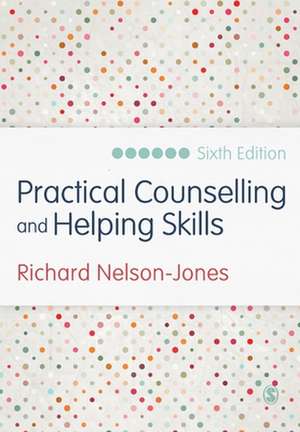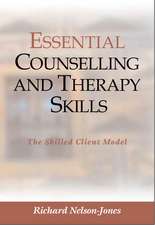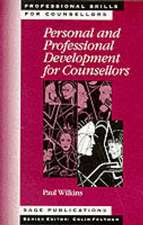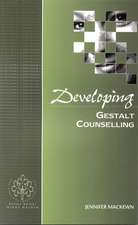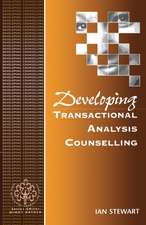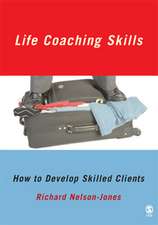Practical Counselling and Helping Skills: Text and Activities for the Lifeskills Counselling Model
Autor Richard Nelson-Jonesen Limba Engleză Paperback – 13 noi 2013
Using practical activities and case examples, the book takes you beyond the basics to more advanced skills, making it an essential companion for all counselling skills courses.
Richard Nelson-Jones has many years' experience as a counsellor, trainer and psychotherapist. His books have helped train thousands of counsellors and helpers worldwide. He is a Fellow of the British and Australian Psychological Societies and of the British Association for Counselling and Psychotherapy.
| Toate formatele și edițiile | Preț | Express |
|---|---|---|
| Paperback (1) | 432.59 lei 3-5 săpt. | +44.13 lei 6-10 zile |
| SAGE Publications – 13 noi 2013 | 432.59 lei 3-5 săpt. | +44.13 lei 6-10 zile |
| Hardback (1) | 1233.17 lei 6-8 săpt. | |
| SAGE Publications – 13 noi 2013 | 1233.17 lei 6-8 săpt. |
Preț: 432.59 lei
Nou
Puncte Express: 649
Preț estimativ în valută:
82.79€ • 84.78$ • 68.86£
82.79€ • 84.78$ • 68.86£
Carte disponibilă
Livrare economică 26 februarie-12 martie
Livrare express 11-15 februarie pentru 54.12 lei
Preluare comenzi: 021 569.72.76
Specificații
ISBN-13: 9781446269855
ISBN-10: 144626985X
Pagini: 528
Ilustrații: illustrations
Dimensiuni: 170 x 242 x 29 mm
Greutate: 0.89 kg
Ediția:Sixth Edition
Editura: SAGE Publications
Colecția Sage Publications Ltd
Locul publicării:London, United Kingdom
ISBN-10: 144626985X
Pagini: 528
Ilustrații: illustrations
Dimensiuni: 170 x 242 x 29 mm
Greutate: 0.89 kg
Ediția:Sixth Edition
Editura: SAGE Publications
Colecția Sage Publications Ltd
Locul publicării:London, United Kingdom
Recenzii
Richard Nelson-Jones is a master of counselling and training and this excellent text is a tribute to what he describes as an 'integrative theoretical framework and model of practice'. Each chapter is packed with insights on the counselling relationship and the practical application of counselling skills. I value it as a resource for teaching communication skills to social workers and counsellors. It is well written, accessible, has numerous case examples and an attention to the languaging of counselling that is grounded in Richard's expertise as a counselling practitioner.
This sixth edition of ‘Practical Counselling and Helping Skills’ is a formidable achievement. Its comprehensiveness, clarity of style and structure and its attention to the latest developments in the field make it an outstanding resource for experienced practitioners, trainers and trainees alike. What is more, Richard Nelson-Jones’ reflectiveness on his immense experience over many decades and in differing cultures gives the book a quality of generous inclusiveness which is rare in the counselling literature. Admirers of such contrasting figures as Carl Rogers, Aaron Beck, Albert Ellis and Gerard Egan will all find much to value in its pages
This is a key textbook for anybody wanting to read an influential summary of all the major approaches and theories of counselling. Detailed, up-to-date explanations and very clear writing makes the book useful to a wide audience: from students and researchers at all levels, to practitioners and their clients.
As I read the 6th edition of Richard Nelson-Jones' Practical Counselling and Helping Skills (PCaHS) I recalled the excitement I experienced when I read the first edition. That was a time when a skills-based approach to counselling was a topic of fierce controversy. It was refreshing to have a book which extended the model from helping to living. Through subsequent editions, Nelson-Jones' basic three-stage helping model has endured because of its utility across a wide range of practice contexts. Many of the ideas which once seemed radical are now accepted widely. New developments, notably thinking and feeling skills, and positive psychology, have been incorporated. PCaHS has always been distinguishable from more basic books on the topic by both its comprehensiveness and its unity. It is this unity of organisation alone which makes me reluctant to think of it as a 'handbook'! It will be a valuable resource for all who want to be challenged to go beyond the simplistic notions of helping currently being fostered by some promoters of life-coaching.
This sixth edition of ‘Practical Counselling and Helping Skills’ is a formidable achievement. Its comprehensiveness, clarity of style and structure and its attention to the latest developments in the field make it an outstanding resource for experienced practitioners, trainers and trainees alike. What is more, Richard Nelson-Jones’ reflectiveness on his immense experience over many decades and in differing cultures gives the book a quality of generous inclusiveness which is rare in the counselling literature. Admirers of such contrasting figures as Carl Rogers, Aaron Beck, Albert Ellis and Gerard Egan will all find much to value in its pages
This is a key textbook for anybody wanting to read an influential summary of all the major approaches and theories of counselling. Detailed, up-to-date explanations and very clear writing makes the book useful to a wide audience: from students and researchers at all levels, to practitioners and their clients.
As I read the 6th edition of Richard Nelson-Jones' Practical Counselling and Helping Skills (PCaHS) I recalled the excitement I experienced when I read the first edition. That was a time when a skills-based approach to counselling was a topic of fierce controversy. It was refreshing to have a book which extended the model from helping to living. Through subsequent editions, Nelson-Jones' basic three-stage helping model has endured because of its utility across a wide range of practice contexts. Many of the ideas which once seemed radical are now accepted widely. New developments, notably thinking and feeling skills, and positive psychology, have been incorporated. PCaHS has always been distinguishable from more basic books on the topic by both its comprehensiveness and its unity. It is this unity of organisation alone which makes me reluctant to think of it as a 'handbook'! It will be a valuable resource for all who want to be challenged to go beyond the simplistic notions of helping currently being fostered by some promoters of life-coaching.
Cuprins
PART ONE: INTRODUCTION
What is counselling and helping?
Create communication skills and feelings
Create mind skills
The lifeskills counselling model
PART TWO: THE RELATING STAGE
Pre-counselling contact
Listening skills
Show understanding skills
Start the counselling and helping process
PART THREE: THE UNDERSTANDING STAGE
Clarify problems skills
Assess feelings and physical reactions
Assess thinking
Assess communication and actions
Agree on a shared definition of problems
PART FOUR: THE CHANGING STAGE
Plan interventions
Deliver interventions
Interventions for thinking - 1
Interventions for thinking - 2
Interventions for communication and actions - 1
Interventions for communication and actions - 2
Interventions for feelings
Negotiate homework
Conduct middle sessions
End and assist client self-helping
PART FIVE: FURTHER CONSIDERATIONS
Relaxation Interventions
Multicultural counselling and helping
Gender-aware counselling and helping
Technology mediated counselling and helping - Jane Evans
Positive counselling and helping
Ethics in practice and training
Supervision
Personal Counselling and Continued Professional Development
What is counselling and helping?
Create communication skills and feelings
Create mind skills
The lifeskills counselling model
PART TWO: THE RELATING STAGE
Pre-counselling contact
Listening skills
Show understanding skills
Start the counselling and helping process
PART THREE: THE UNDERSTANDING STAGE
Clarify problems skills
Assess feelings and physical reactions
Assess thinking
Assess communication and actions
Agree on a shared definition of problems
PART FOUR: THE CHANGING STAGE
Plan interventions
Deliver interventions
Interventions for thinking - 1
Interventions for thinking - 2
Interventions for communication and actions - 1
Interventions for communication and actions - 2
Interventions for feelings
Negotiate homework
Conduct middle sessions
End and assist client self-helping
PART FIVE: FURTHER CONSIDERATIONS
Relaxation Interventions
Multicultural counselling and helping
Gender-aware counselling and helping
Technology mediated counselling and helping - Jane Evans
Positive counselling and helping
Ethics in practice and training
Supervision
Personal Counselling and Continued Professional Development
Descriere
This sixth edition of Richard Nelson-Jones' bestselling book is a step-by-step guide to using counselling and helping skills with confidence and proficiency. The author's three-stage model of counselling is designed to facilitate developing lifeskills in clients and to help them to change how they feel, think, communicate and act.
